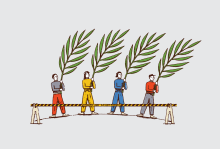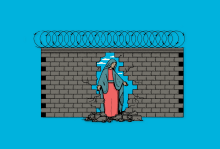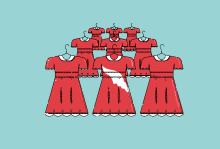Commentary

WE DON'T KNOW the full extent of the coronavirus pandemic. We know of the many who have died as a direct result of infection. We know that whole countries have turned on a dime to shield themselves from the shadow of death as it passes over. We don’t know where it will lead.
In the wake of Hurricane Katrina, Rebecca Solnit wrote, “Horrible in itself, disaster is sometimes a door back into paradise, that paradise at least in which we are who we hope to be, do the work we desire, and are each our sister’s and brother’s keeper.” Solnit reminds us that disasters and plagues sometimes signal liberation.
COVID-19 has forced the human community into mourning. In our retreat from the work-a-day world, it has imposed a global sabbath and Jubilee. Staring into this “cruel scourge,” as John of Ephesus described the Justinian plague in the year 545 C.E., can we also see that another world is possible?
The Jubilee legislation found in Leviticus 25 lays out a vision for “social and economic reform unsurpassed in the ancient Near East,” according to Robert K. Gnuse. The Jubilee laws declared that Yahweh was the rightful owner of all the earth, and therefore all Israelites—rich and poor—have an equal right to its abundance, within limits. In an economic system based on land and its produce, this was a radical transformation. The legislation undercut wealth disparities by preventing land speculation and by mandating debt forgiveness and interest-free loans. Finally, it ordered the release of the enslaved and those in debtors’ prison.

WHEN SOMEONE IS dying, most of us know how to offer support. We don’t question their treatment choices. We bring them meals and rake their leaves and shovel their sidewalks. When a congregation closes—or dies—such acts of kindness are no less important. As a Lutheran interim pastor who has led two congregations to “holy closure,” I offer some suggestions for how to accompany a congregation as it ends.
Don’t make a decision to close more difficult by questioning it. A closing congregation has likely tried all the stewardship programs, read all the church-growth books, and revamped its outreach program a hundred times. For any number of reasons, none of those worked. Members feel as though they have failed in mission for God. What they need from the wider church is compassion and a reminder that Christians are people of resurrection who believe that life can spring from death. In fact, sometimes something needs to die so that something else can be birthed in its place. They will struggle to believe that, and you can remind them as often as they need to hear it that closure can be a faithful choice.

IN OCTOBER LAST year, protesters stood silently in the streets of Kraków and Szczecin in Poland. This gathering was not criticizing the ruling political party. Instead, their banners bore the slogan “We Want the Church Back,” echoing “We Are the Church” movements directed at the Catholic hierarchy by laity around the world.
These Roman Catholics call to account sermons offered by conservative Polish clergy. The clerical leadership is “dividing people and spreading hostility toward others instead of teaching about our merciful God,” the group explained in a petition. Many Catholics in Poland feel homeless because they experience hostility, condemnation, and exclusion from the pulpit. They want to publicly demonstrate that the Catholic Church is larger than priests and bishops; that everyone, regardless of their sexual orientation or minority status, should be able to find a place in the church that calls itself catholic (which means “universal”). Finally, they demand that the priests and bishops not reject Pope Francis’ message and that Catholic social teaching, the church doctrines on human dignity and common good in society, be returned to the mainstream of Catholic life.
A month later in Gdańsk, 150 members of the archdiocese protested the bishops’ negligent handing of sexual abuse cases. They were responding to a study by the conference of bishops released in March that noted nearly 400 cases of Polish priests accused of abuse of minors between 1990 and 2018 and to the release of a documentary, Don’t Tell Anyone, in which priests are confronted by their victims. The hierarchy refused to investigate reported incidents and failed to openly support the victims. Lay Catholics also specifically criticized Gdańsk’s Archbishop Sławoj Leszek Głódź for his lavish lifestyle and confrontational communication style.

PRESIDENT TRUMP SPENT a large portion of his State of the Union speech in February touting his economic accomplishments, including cutting taxes and “job-killing regulations.” But what has America gotten in exchange for the 2017 Republican tax overhaul?
First, 2018 showed the largest drop in household charitable contributions since the Great Recession and the first drop in more than five years. Despite steady economic growth over the past 10 years and a more than 5 percent increase in individual giving the year before, this dramatic decline has left many organizations—including local churches, food pantries, and homelessness services—struggling to meet the needs of those they serve.
The Republican-passed Tax Cuts and Jobs Act of 2017 was the most sweeping overhaul to the federal tax code in decades. Among other things, it doubled the standard deduction. It is no longer cost-effective for most Americans to itemize donations. This creates a “giving gap” between middle-class donors and ultra-wealthy donors.
Even some Republicans found these changes controversial. They were unable to hide that most benefits would accrue to Americans with incomes in the top 5 percent.

ON AN OTHERWISE quiet Thanksgiving weekend last year, the riverbank next to Revere Copper and Brass, the company known for making pots and pans that also made parts for nuclear weapons, collapsed into the Detroit River. The event was missed not only by many Detroiters but by most Americans, who remain largely unaware of the dangers of our crumbling former nuclear weapons sites. Michigan state agencies claimed that no radioactivity was released by the literal “fall-out”—or in this case, “fall-down”—but can they be trusted? Decades of misinformation about our nuclear weapons plants should put everyone on guard.
Work on the United States’ first atomic bomb took place at Detroit’s Revere site during World War II, and the facility continued to make uranium rods during the Cold War. During this era, intensive nuclear weapons production systematically contaminated lands surrounding such Department of Energy sites as Rocky Flats in Colorado, Pantex in Texas, and Hanford in Washington state. As we enter a new era when these now-defunct sites are either remediated or left to crumble, what do we need to know?
Water safety is only one concern. The fact that Michigan’s state agencies only found out about the spill after the Canadian side reported it should be a red flag. It took a full week for the state’s environmental agency to test the water at the Revere location, just downstream from the intake pipes for drinking water for most southeast Michigan residents. Michigan especially should be vigilant regarding water safety, with Flint residents still waiting for safe drinking water.

ELECTIONS ARE A chance for voters to throw their support behind leaders they think are going to best bring about our hopes and visions for what this country can be. But there are a lot of reasons why eligible Americans may have a hard time casting a ballot that counts. One reason is sloppy purges of the voter rolls.
Purges are a practice—often controversial—of election administrators removing or cancelling voters from registration lists in order to update state registration rolls. We all benefit from clean and accurate voter rolls, which are used by poll workers to identify who is registered to vote. There is no real dispute that people who are not eligible should be removed from the rolls. Too often, however, purge processes are shrouded in secrecy, prone to error, and vulnerable to manipulation.
Part of the reason purges are so controversial is because more voters are being purged than in the past, and there is no satisfying explanation as to why. Between 2006 and 2008, the U.S. purged about 12 million voters. Between 2016 and 2018, however, the U.S. purged about 17 million voters. That’s an increase of more than 33 percent—during a time when total population growth was about 6 percent and the number of registered voters increased by 18 percent.
Another reason purges are controversial are their locations. Battleground states like Ohio and Wisconsin have had recent purge flare-ups. Ohio has a practice whereby voters who miss one election are put on a track for removal from the rolls. While voters can take steps to get themselves off that track, many believe that starting the process after missing only one election is too aggressive.

IN LESS THAN two weeks in late 2019, three heads of government (in Iraq, Lebanon, and Bolivia) agreed to step down under pressure from mass protests. Earlier last year, long-standing military dictators in Sudan and Algeria were forced from power following popular uprisings.
On their own, these events are remarkable. What makes them truly extraordinary is that they came amid a worldwide protest wave from Hong Kong to Manipur to Chile that has toppled governments, led to new social policies, and challenged basic economic structures.
Authoritarian regimes are not protesters’ only targets. In Chile, considered an oasis of stability in South America, protests triggered by a hike in subway fares have grown into popular demands for an end to corruption and economic inequality. And the global climate movement has used walkouts, sit-ins, and civil disobedience to dramatize the need for urgent action. In each case, popular dissatisfaction with traditional institutional approaches has encouraged a turn to extra-institutional (and at times extra-legal) resistance.
Surprisingly, this proliferation of people-power movements has taken place amid a period of declining effectiveness for movements. While around 70 percent of major nonviolent movements in the 1990s succeeded, only around 30 percent did so from 2010 to 2017. Protests have been easier to start but more difficult to resolve. So, have the movements of 2019 broken these trends?
We link the declining rates of effectiveness and their potential reversal to the emergence of parallel global networks of protesters and repressive governments (both dictatorships and democracies), who use increasing access to global information to rapidly learn from one another. This means that ideas, symbols, and tactics that both help movements succeed and successfully suppress them spread quickly from their origins to other struggles. In the past, waves of successful protests often lasted years. What we are seeing now—and are likely to see more of in the future—are short, sharp waves of successful protests followed by short waves of failures.

ON A COLD January day in 2010, Supreme Court Justice John Paul Stevens felt so strongly about the dangers of corruption that he delivered a rare oral dissent in the Citizens United case. Decrying the majority’s “crabbed view of corruption” that focused on quid pro quo arrangements exclusively, Justice Stevens countered, “There are threats of corruption that are far more destructive to democratic society than the odd bribe. Yet the majority’s understanding of corruption would leave lawmakers impotent to address all but the most discrete abuses.”
In retrospect, the striking thing from that winter morning was not so much the existence of Steven’s oral dissent (though notable), but the basic agreement on all sides. No one on the court contested the idea that corruption poses a threat to “democratic society.” The majority and the minority simply split on whether the specific practice at issue constituted a form of corruption.
Ten years later, we cannot take the same presupposition for granted. Instead of identifying corruption as a danger to the republic, we are all too ready to treat it as an inescapable part of American life. Indeed, the rationalizations have now become as predictable as they are depressing: It may be distasteful, but both sides do it. It is a necessary evil. Get over it.

ON ASH WEDNESDAY the dust from which we came and to which we return is daubed on Christians’ foreheads. It is an intimate reminder that the Spirit of God breathes in us and we live; without the Spirit we crumble.
To be more Christlike means facing death in all its forms—the death of reputation, the death of truth, and the bodily death of our beloveds. Lenten scriptures keep before us stories of temptation, failure, and the heavy machinery of this empire or that, always shifting into position to crush those who threaten human power and wealth. There are hints of resurrection in the lectionary readings, but the pain and destruction of dreams and life that comes before is given its full due.
We are too well acquainted with the world and its ways not to imagine what massacre or plague filled that valley with dry bones in Ezekiel’s vision. And, in John’s gospel, Jesus is confronted by Lazarus’ grieving, accusing sister. Why did you not come when called? Mary demands, while Lazarus was alive and could be healed. The story is raw with the pitch of her rage and Jesus’ own tears.

IN 2016, CANDIDATE Donald Trump vowed to halt “endless wars.” The Democratic candidates running for president this year have made similar promises.
Yet, following the drone-strike killing of Iran’s senior military commander in early January, more troops are going to the Middle East and military tensions have increased. U.S. forces continue to drop bombs and conduct combat operations in Afghanistan and other countries, as Washington’s propensity for military intervention shows little sign of abating. The power of the Pentagon has increased and will grow further in the years ahead as the 2020 military budget doubles down on money and weapons to wage war across the globe.
When most of us hear the term endless war, we think of Afghanistan. Rightly so, as the war is now in its 19th year, with no end in sight. For years we were told by political leaders, including President Obama, that the Afghanistan conflict was a legal and justified war, as opposed to the illegal invasion and occupation of Iraq. Our persistent efforts, we were told, were paying off in countering terrorism and advancing democracy and human rights.
Now we know this was a lie. The release of the so-called Afghanistan Papers in December revealed systematic deception and failure. Based on 2,000 pages of confidential interviews with those who fought and directed the war, the Afghanistan Papers confirm that Pentagon and White House officials made claims of success they knew to be false and refused to admit the war was unwinnable.

I CAN NAME Emma’s favorite foods: roasted sweet potatoes and acai smoothie bowls. I’ve spent hours with her two sisters and classmates. We’ve traveled across the country together and danced to all her most-loved songs.
Week after week, with one tap on my screen, I instantly enter Emma’s world. As we laugh and smile at each other, it feels as if I am spending time with a friend, albeit a virtual one.
Emma Abrahamson is one of the countless Generation Z video bloggers on YouTube (some with tens of millions of followers) who are re-creating the nature of human friendship and experience.
The next presidential election will include a wave of Gen Zers voting for the first time. Who are they? What do they care about?
Beginning with those born in 1995, the same year as the commercial internet, Gen Zers only know a life of navigating multiple realities. While I (a millennial) am part of the generation shaped by the arrival of instant communication, Gen Z is the generation shaped by the arrival of instant experience. They are constantly living on the cusp of the virtual and the physical—and, just like Emma, draw the rest of us in.
Some worry that such a technology-centered existence, filled with YouTube friends and instantaneous everything, leaves young people isolated and ill-equipped to live with uncertainty. Researchers claim it is leading to the highest rates of anxiety, depression, and suicide ever recorded.

BEFORE SUNRISE, the Chicago Federation of Labor team hit the city streets in an SUV packed with fresh donuts and hot coffee. We were bringing encouragement to picketing Chicago Teachers Union (CTU) Local 1 and Service Employees International Union (SEIU) Local 73 members. A cold front swept through on the first day of the Chicago public schools strike, which launched tens of thousands of public school teachers and school support staff into the streets in October, but it could not chill the fire for justice in the union members. They wanted something better not just for themselves but for the children they taught and cared for and the communities they came from.
Our first stop was Pulaski International School in Logan Square, home to nearly 900 students. The teachers and support staff were already on the sidewalks—wearing red for CTU and purple for SEIU 73. The teachers and staff at Pulaski identified class sizes and more prep time as key challenges.
We drove south to East Garfield Park, stopping at Westinghouse and Marshall high schools. Several NBA and NFL stars and other notable Chicagoans graduated from these schools. Sadly, during the strike, gunfire claimed the life of a Marshall student. Teachers and staff said more counselors and nurses were needed. Cardenas and Castellanos elementary schools also needed counselors. Immigration and Customs Enforcement raids have traumatized many of the children, who have seen relatives and classmates disappear.
One of the last schools we visited was Ida B. Wells Elementary in Bronzeville, where poverty is the school’s biggest challenge. Dozens of students showed up at the closed school because they had nowhere else to go and nothing to eat.

FROM THE SOUTH CAROLINA Democratic primary onward, the votes for the presidency cast by black churchgoers will be criticized by many white people. Even now, black churchgoers’ feelings are speculated about in the press, like in-progress crimes announced on a police scanner.
Media and election pundits ask: “Are they going to choose Joe Biden because of his relationship with Barack Obama? Are they going to go for Elizabeth Warren because of her plan to give $50 billion to historically black colleges and universities and other minority-serving institutions? Are they going to bypass Pete Buttigieg because he’s gay?”
The latter question is the most problematic—an attempt to deem all black churchgoers as homophobic, as if homophobia is something no other racial, ethnic, or religious group has played a part in; as if there’s no such thing as the black grandfather who accepts his gay grandson; the black grandmother who always asks how her grandson’s boyfriend is doing; or the black grandmother who puts on her “good wig” to hang out with said boyfriend when he visits the South. All three are my Christian grandparents, and they’re not alone.
But the most problematic aspect of the Buttigieg question is what it reveals about white sight: Black churchgoers of the electorate are seen as tools to bring about a desired election result, and scapegoats if the election doesn’t go the white way.

IN 2015, POPE FRANCIS directed a provocative question to the U.S. Congress: “Why are deadly weapons being sold to those who plan to inflict untold suffering on individuals and society?”
As the source of roughly 36 percent of the world’s military exports, the United States is the largest weapons supplier in the world. According to data released last spring by the Stockholm International Peace Research Institute, the U.S. exported arms to at least 98 countries in the past five years. These deliveries often included advanced weapons such as combat aircraft, short-range cruise and ballistic missiles, and guided bombs.
Ten of the 25 countries buying the most weapons from the U.S. are NATO members or part of other U.S. security alliances. In 2017, the U.S. set a record of $75.9 billion in weapons sales in a year, pursuant to congressional approval. Saudi Arabia is the biggest recipient of U.S. arms. In August 2018, the Saudi military used a 500-pound, MK 82 guided bomb built by Lockheed Martin, a U.S. weapons manufacturer, to destroy a school bus in a market in the Yemeni town of Dahyan. They killed more than 50 people, including 40 children. One of the victims, Ali Mohammed Hassan Da’i, was 10 years old. Another, Ali Zaid Hussein Tayeb, was 9 years old.

IN OCTOBER, POPE FRANCIS convened hundreds of people in Rome to discuss the Indigenous face of the church in the Amazon. The three-week, multitrack meetings, which included lay leaders, members of religious communities, priests, expert witnesses, bishops, cardinals, and leaders of Indigenous organizations, was the result of a two-year listening process during which more than 65,000 people in the Amazonia region were asked: What are the most pressing issues you face?
The agenda used for the synod of bishops at the Vatican, as well as the wide variety of interconnected parallel gatherings around the city—under the umbrella of “The Amazon: Common Home” (la Casa Comun)—outlined the collected wisdom: Listen to the voice of Amazonia. Pursue ecological conversion. Support the prophetic Indigenous church.
One parallel gathering met in the Church of Santa Maria in Traspontina, a 10-minute walk from St. Peter’s Basilica. Hundreds of Amazonian Indigenous leaders and guests met at Santa Maria to pray, listen, and conceive a new world—one that celebrates the eternal truth of the proclamation of Jesus Christ: We are all loved. We all belong. All creation is deeply connected.

IN THE PAST three years, the Trump administration has upended decades of legal precedent that created a humane legal process for asylum seekers to enter the U.S. and build a life for themselves while they wait to plead their case in front of an immigration judge.
Asylum is a protection available to foreign nationals already in the United States or at the U.S. border who meet the international law definition of a “refugee.” A refugee is a person who can’t go home because of “past persecution or a well-founded fear of being persecuted in the future” due to their race, religion, nationality, membership in a particular social group, or political opinion, according to the United Nations.
On the U.S. Southern border, these are people fleeing organized violence and government repression. Under Trump administration “third-country” agreements, the U.S. will now be deporting many asylum seekers back to the same countries that they are fleeing.
While this scenario is exactly what Trump’s lead immigration policy adviser, Stephen Miller, has always dreamed of, it is not one we have to accept.
People have offered one another sanctuary in various forms throughout history. Christianity has a long tradition of such radical welcome—including biblical texts making clear the mandate to “welcome the stranger” and hundreds of churches that opened their doors as sanctuaries to runaway slaves in the 1860s, civil rights and anti-war activists in the 1960s, and migrants from Central America in the 1980s.

EVERY EMPIRE IN human history has used the tactics of fear. This fear is evident in the fact that for generations a dark skin hue has automatically made a person at best suspect, at worst a criminal. The empire identifies those whose language and nationality are different as less than human. Dehumanization becomes a tool to justify heinous laws, promoting them as necessary to protect citizens from a horde of savages, criminals, rapists, thugs, or whatever new word is used to instill fear.
Our sacred texts tell the stories of emperors, rulers, and pharaohs who justified mass extermination to maintain power. Herod the Great is one example. Herod was a ruler so deranged and paranoid about losing power that he had his wife, brother-in-law, and three sons murdered to wipe away any trace of royal blood who might challenge his throne.
It is under Herod’s rule that we encounter the revolutionary words of Mary as she proclaims her song of praise, the Magnificat (Luke 1:46-55). For generations, Christians have reduced the Magnificat to a simplistic, spiritual song from a docile, obedient girl chosen by God. The political undertones and demands for justice against rulers and laws that oppress God’s people are rarely elevated.

A FEW MONTHS AGO, I was driving from Peterborough, Ontario, to my home at Six Nations Reserve. The route took me through the traditional homelands of the Anishinaabe.
I began to feel and smell the spirit of the ancestors. On the right were farmlands; on the left, townhouses. In the distance, I could see the metropolis of Toronto. This is where Anishinaabe walked, hunted, gathered, and lived for years before first contact with Europeans. When the settlers came, they built structures to suit their needs. They took over the land by force, trickery, and other means. The concept of buying and selling land is absent from the Indigenous way of life. You cannot sell what the Creator has given you.
Many churches in Canada were built on Indigenous land, first by the Church of England and then the Anglican Church of Canada (ACC). Six Anglican churches were built on the Six Nations where I live. They are a part of my Anglican history; I can trace my Anglican roots to the early 1700s. It is a rich history. And complicated.

IN JERUSALEM'S OLD CITY, prices are seldom posted. Negotiating is not only welcomed but necessary. It is customary for the merchant to initially ask for a price far in excess of what both parties know to be reasonable. When such an offer is made, it is perfectly valid for the customer to reject the offer; only then does the real negotiation begin. But if the merchant’s counteroffers get progressively higher, it is perfectly justifiable for the customer to question whether the vendor is genuinely interested in selling.
For the past 30 years, the Israeli-Palestinian peace process has often resembled a dysfunctional bazaar transaction. With each round of negotiations, Palestinians have been asked to pay a higher and higher price. The Trump administration plan released in June, called “Peace to Prosperity,” is no exception. But why are its terms so unacceptable to Palestinians?
Palestinian political leadership has consistently expressed its aim to establish a sovereign state in which the Palestinian people can exercise national self-determination. As Israeli-Palestinian peace talks over the past quarter century have demonstrated, the issues of borders, Israeli settlements, and Jerusalem are all negotiable to some extent, but any plan that requires Palestinians to relinquish the fundamental aim of national sovereignty is setting the price too high.

JESSIE RENAE WATERS (Oglala Sioux) was pregnant and found murdered April 30, 2015, near her home in Oglala, S.D. Her case remains unsolved to this day. Savanna LaFontaine-Greywind (Spirit Lake) was murdered Aug. 19, 2018, by a neighbor in Fargo, N.D. Her body was not found for eight days. Jessie and Savanna are someone’s daughter, sister, grandchild.
The National Crime Information Center reported that in 2016 there were more than 5,700 reports of missing Indigenous women and girls, a rate much higher than that of other groups of women.
Ashley Loring Heavy Runner (Blackfeet) disappeared from Browning, Mont., located on the Blackfeet Indian Reservation, on June 12, 2017. With little help from authorities, Heavy Runner’s family found support from the Blackfeet United Methodist Parish in Browning. On Dec. 12, 2018, the family took Ashley’s story to the Senate Committee on Indian Affairs. The parish helped with travel expenses, found additional support, and began advocating for Murdered and Missing Indigenous Women and Girls (MMIWG).